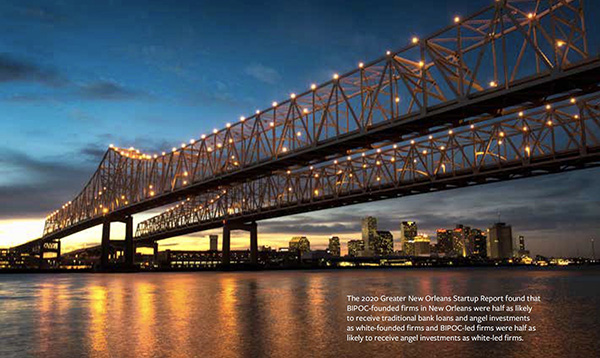
In the wake of a summer marked by protests surrounding racial injustice in the U.S., a report from the A. B. Freeman School of Business highlighted striking inequities in funding between firms owned by Black, Indigenous and People of Color (BIPOC) and white-owned firms.
The 2020 Greater New Orleans Startup Report, a project of the Freeman School’s Albert Lepage Center for Entrepreneurship and Innovation, found that BIPOC-founded firms in New Orleans were half as likely to receive traditional bank loans and angel investments as white-founded firms. Companies with BIPOC leadership were also half as likely to receive angel investments as companies with white leadership.
“These insights come directly from our startup community and provide a clear, unflinching look at what BIPOC founders in our region experience,” said Rob Lalka, executive director of the Lepage Center. “It’s our hope that continuing to collect data year after year will help us build on work we’ve already done to understand these issues and assess our progress toward addressing them.”
To collect data for the annual report, the Lepage Center partners with business organizations across the region to survey startups and early-stage ventures. For the 2020 report, the center and its partners made a special effort to reach out to BIPOC firms in order to present a fuller, more accurate picture of the New Orleans startup community.
Thanks in part to these outreach efforts, representation of Black-owned businesses in the dataset increased from 13% to 24%, which according to the New Orleans Data Center is more reflective of the Greater New Orleans business community. With this more representative sample of New Orleans-area entrepreneurs, the report found significant racial disparities in funding access and business outcomes.
• BIPOC-founded firms were less likely to receive traditional bank loans (8% vs. 16%) and angel investment (11% vs. 23%)
• Only 8% of BIPOC-founded firms made over $1 million in revenue versus 28% of white-founded firms
• 23% of BIPOC-founded firms had profit margins of 10% or less compared to just 8% of white-founded firms
• Companies with leadership teams of only white executives were more likely to receive angel investment (21% vs. 11%)
Data collection for the 2021 report, which will be published in the fall, took place in February and March of this year. The Lepage Center and its partners worked to increase the representation of Latinx entrepreneurs through Spanishlanguage outreach and by offering the survey in Spanish. Thanks to these efforts, the representation of Latinx entrepreneurs increased from 3.2% in 2020 to nearly 7% in 2021, which according to the New Orleans Data Center is representative of the New Orleans metro area. Among the new partners the Lepage Center worked with on its outreach efforts were the New Orleans Chamber of Commerce, the City of New Orleans, the St. Bernard Economic Development Foundation, the Algiers Economic Development Foundation, El Centro and Flyte.
The 2021 Greater New Orleans Startup Survey will also be the first comprehensive, entrepreneur-reported data collection effort in the region since the COVID-19 shutdowns. Questions regarding access to COVID-19 relief funding, such as the Payroll Protection Program and the Economic Injury Disaster Loan, were added to the survey.
“The Lepage Center and its partners surveyed the local startup community in January and February of 2020, prior to the economic shutdowns resulting from COVID-19,” said Ira Solomon, dean of the Freeman School. “These data represent how business owners expected the year to look, absent the pandemic. With this updated 2021 dataset, it is our hope and expectation that this year’s report will help track our region’s progress as the economy recovers from COVID-19.”

